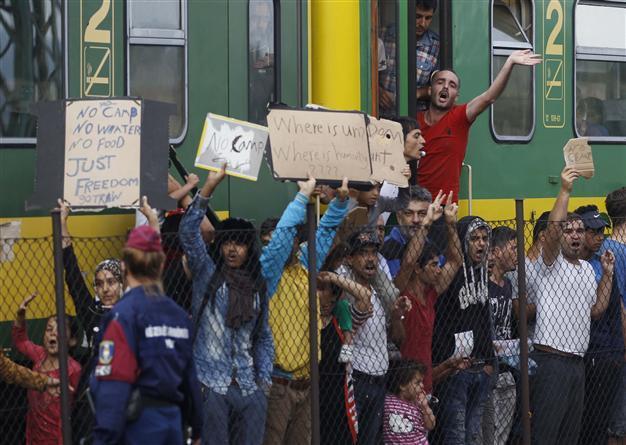People shout slogans outside a train that was stopped in Bicske, Hungary, Friday, Sept. 4, 2015. AP Photo
EU countries were set to try to bridge differences on Europe's escalating migrant crisis at a foreign ministers' meeting on Sept.4, with the shocking image of a dead Syrian toddler washed up on a beach driving calls for binding refugee quotas.
The heartbreaking images of three-year-old Aylan Kurdi lying dead in the surf -- and his father's emotional account of how the little boy and his four-year-old brother "slipped through my hands" -- have ramped up pressure on political leaders to address Europe's worst refugee crisis since World War II.
Under-fire British Prime Minister David Cameron, whose country has been accused of failing to help shoulder the burden, is expected to announce a plan later Friday to take in more Syrian refugees.
German Chancellor Angela Merkel and French President Francois Hollande on Sept.3 urged EU members to accept "binding" refugee quotas.
In Hungary, meanwhile, a tense standoff continued between police and hundreds of refugees blocked by police from carrying on their journey west towards Germany.
On Sept.3, the police allowed the refugees board a train in Budapest bound for the Austrian border. But their journey ended just west of the capital in Bicske, where police tried to disembark them and take them to a refugee processing camp.
An estimated 200 to 300 people, angry at what they saw as Hungary's trickery, refused to get off the train, where they spent the night.
EU foreign ministers were to meet later in Luxembourg to discuss the crisis, which has split the bloc between countries like Germany advocating greater solidarity with the refugees and nations such as Hungary that have taken a hardline approach.
In a statement on Sept.4, UN High Commissioner for Refugees Antonio Guterres said the EU faced "a defining moment".
Referring to the pictures of little Aylan which have dominated newspaper front pages this week, he said: "Europe cannot go on responding to this crisis with a piecemeal or incremental approach."
"No country can do it alone, and no country can refuse to do its part," he added, calling for a "mass relocation programme, with the mandatory participation of all EU member states" that would take up to 200,000 refugees.
Europe is facing a huge influx on all sides, with more than 350,000 people crossing the Mediterranean in flimsy boats this year alone, according to the International Organisation for Migration.
In London, British media reported that Cameron was drawing up a plan to accept "thousands" of refugees, with the option of directly accepting refugees from UN camps on the Syrian border under consideration.
Cameron earlier promised the country would fulfil its "moral responsibilities", after having only accepted 216 Syrian refugees over the past year. He said the numbers allowed would be kept "under review".
Merkel and Hollande said on Sept.3 they had agreed the EU members should take in a minimum number of migrants.
"We agree that... we need binding quotas within the European Union to share the burden. That is the principle of solidarity," Merkel told reporters during a visit to the Swiss capital.
European Commission President Jean-Claude Juncker will next week unveil a plan for the relocation of at least 120,000 more refugees to ease the burden on frontline EU nations Greece, Italy and Hungary, a European source told AFP.
EU president Donald Tusk called on member states to resettle at least 100,000 refugees -- far above the current agreement for 32,000.
The human cost of the migrant crisis has been brought into sharp focus by Aylan's drowning.
His father Abdullah Kurdi, who also lost his wife in Wednesday's tragedy, has told of the horrific moments when the family of four was tipped into the Mediterranean off Turkey's coast.
"I was holding my wife's hand. But my children slipped through my hands," he told Turkey's Doğan News Agency on Sept.3.
Reports said the child -- one of at least 12 Syrians who died when their boats sank trying to reach Greece -- and his family were trying to get to Canada from the Syrian flashpoint of Kobane after fleeing to Turkey last year to escape Islamic State of Iraq and the Levant (ISIL) extremists.
Canada denied it had received an asylum request from the boy's family.
The picture of the child's lifeless body sent shock waves across social media and prompted a furious reaction from, among others, Turkish President Recep Tayyip Erdoğan.
"European countries, which turned the Mediterranean Sea -- the cradle of ancient civilisations -- into a migrant cemetery are party to the crime that takes place when each refugee loses their life," he said in a speech.
Turkey is host to 1.8 million refugees from the conflict in neighbouring Syria.
On a visit to Greece, which has seen the largest number of migrant arrivals in the EU, European Commission Vice-President Frans Timmermans said Europe was facing an "unprecedented humanitarian and political crisis".
EU foreign policy chief Federica Mogherini said the EU's new naval mission could step up action against people smugglers in the Mediterranean within weeks, seizing and destroying smugglers' boats.
